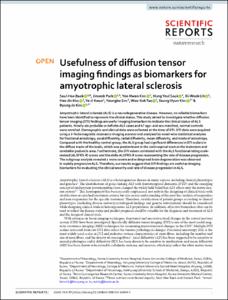Usefulness of diffusion tensor imaging findings as biomarkers for amyotrophic lateral sclerosis
- Keimyung Author(s)
- Seok, Hung Youl
- Department
- Dept. of Neurology (신경과학)
- Journal Title
- Scientific Reports
- Issued Date
- 2020
- Volume
- 10
- Issue
- 1
- Abstract
- Amyotrophic lateral sclerosis (ALS) is a neurodegenerative disease. However, no reliable biomarkers have been identified to represent the clinical status. This study aimed to investigate whether diffusion tensor imaging (DTI) findings are useful imaging biomarkers to indicate the clinical status of ALS patients. Ninety-six probable or definite ALS cases and 47 age- and sex-matched, normal controls were enrolled. Demographic and clinical data were collected at the time of DTI. DTI data were acquired using a 3-Tesla magnetic resonance imaging scanner and analysed by voxel-wise statistical analyses for fractional anisotropy, axial diffusivity, radial diffusivity, mean diffusivity, and mode of anisotropy. Compared with the healthy control group, the ALS group had significant differences in DTI scalars in the diffuse tracts of the brain, which was predominant in the corticospinal tract at the brainstem and cerebellar peduncle area. Furthermore, the DTI values correlated with the ALS functional rating scale-revised (ALSFRS-R) scores and the delta ALSFRS-R score representing the rate of disease progression. The subgroup analysis revealed a more severe and widespread brain degeneration was observed in rapidly progressive ALS. Therefore, our results suggest that DTI findings are useful as imaging biomarkers for evaluating the clinical severity and rate of disease progression in ALS.
- Keimyung Author(s)(Kor)
- 석흥열
- Publisher
- School of Medicine (의과대학)
- Citation
- Seol-Hee Baek et al. (2020). Usefulness of diffusion tensor imaging findings as biomarkers for amyotrophic lateral sclerosis. Scientific Reports, 10(1), 5199. doi: 10.1038/s41598-020-62049-0
- Type
- Article
- ISSN
- 2045-2322
- Source
- https://www.nature.com/articles/s41598-020-62049-0
- Appears in Collections:
- 1. School of Medicine (의과대학) > Dept. of Neurology (신경과학)
- 파일 목록
-
-
Download
 oak-2020-0563.pdf
기타 데이터 / 1.9 MB / Adobe PDF
oak-2020-0563.pdf
기타 데이터 / 1.9 MB / Adobe PDF
-
Items in Repository are protected by copyright, with all rights reserved, unless otherwise indicated.